
The liturgical year, also called the church year, Christian year or kalendar, consists of the cycle of liturgical seasons in Christian churches that determines when feast days, including celebrations of saints, are to be observed, and which portions of Scripture are to be read either in an annual cycle or in a cycle of several years.

Ecumenism – also called interdenominationalism, or ecumenicalism – is the concept and principle that Christians who belong to different Christian denominations should work together to develop closer relationships among their churches and promote Christian unity. The adjective ecumenical is thus applied to any non-denominational initiative that encourages greater cooperation and union among Christian denominations and churches.
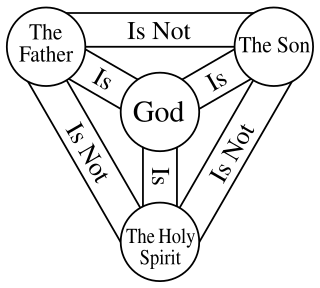
The Trinitarian formula is the phrase "in the name of the Father, and of the Son, and of the Holy Spirit", or words to that form and effect, referring to the three persons of the Christian Trinity. It is often followed by an "amen".

Trinity Sunday is the first Sunday after Pentecost in the Western Christian liturgical calendar, and the Sunday of Pentecost in Eastern Christianity. Trinity Sunday celebrates the Christian doctrine of the Trinity, the three Persons of God: the Father, the Son, and the Holy Spirit.

Ember days are quarterly periods of prayer and fasting in the liturgical calendar of Western Christian churches. These fasts traditionally take place on the Wednesday, Friday, and Saturday of the weeks following St Lucy's Day, the first Sunday in Lent, Pentecost (Whitsun), and Holy Cross Day, though some areas follow a different pattern. The Catholic Church ended its practice of fasting on these days in 1966, and the Anglican Communion made fasting optional in 1976. Ordination ceremonies are often held on Ember Saturdays or the following Sunday.
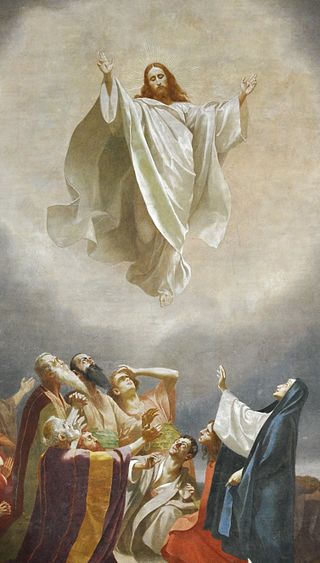
The Feast of the Ascension of Jesus Christ commemorates the Christian belief of the bodily Ascension of Jesus into Heaven. It is one of the ecumenical feasts of Christian churches, ranking with the feasts of the Passion and Pentecost. Following the account of Acts 1:3 that the risen Jesus appeared for 40 days prior to his Ascension, Ascension Day is traditionally celebrated on a Thursday, the fortieth day of Easter, although some Christian denominations have moved the observance to the following Sunday, sometimes called Ascension Sunday. The day of observance varies by ecclesiastical province in many Christian denominations, as with Methodists and Catholics, for example.
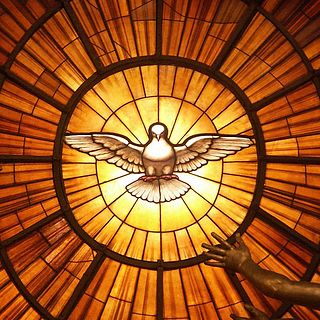
The Catholic Charismatic Renewal (CCR) is a movement within the Catholic Church that is part of the wider charismatic movement across historic Christian churches.
The Society of the Atonement, also known as the Friars and Sisters of the Atonement or Graymoor Friars and Sisters is a Franciscan religious congregation in the Catholic Church. The friars and sisters were founded in 1898 by Paul Wattson and Lurana White as a religious community in the Episcopal Church. The religious order is dedicated to the Blessed Virgin Mary under the Marian title of Our Lady of Atonement.
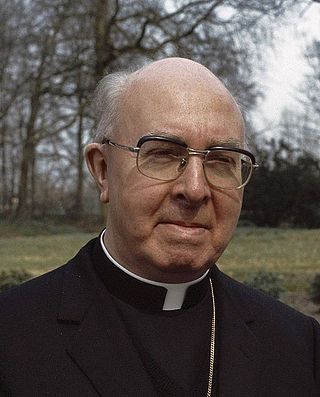
Johannes Gerardus Maria Willebrands was a Dutch Cardinal of the Roman Catholic Church. He served as President of the Pontifical Council for Promoting Christian Unity from 1969 to 1989, and Archbishop of Utrecht from 1975 to 1983. Elevated to the cardinalate in 1969, Willebrands was central to the increased ecumenism of the Church in the second half of the 20th century, and was considered papabile at the two conclaves held in 1978.
"Octave" has two senses in Christian liturgical usage. In the first sense, it is the eighth day after a feast, reckoning inclusively, and so always falls on the same day of the week as the feast itself. The word is derived from Latin octava (eighth), with dies (day) understood. In the second sense, the term is applied to the whole period of these eight days, during which certain major feasts came to be observed.
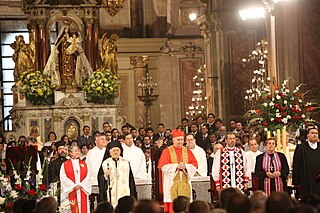
The Catholic Church has engaged in the modern ecumenical movement especially since the Second Vatican Council (1962-1965) and the issuing of the decree Unitatis redintegratio and the declaration Dignitatis humanae. It was at the Council that the Pontifical Council for Promoting Christian Unity was created. Those outside of the Catholic Church were categorised as heretics or schismatics, but in many contexts today, to avoid offence, the euphemism "separated brethren" is used.
Paul Irénée Couturier was a French priest and a promoter of the concept of Christian unity. He was instrumental in the establishment of the Week of Prayer for Christian Unity.
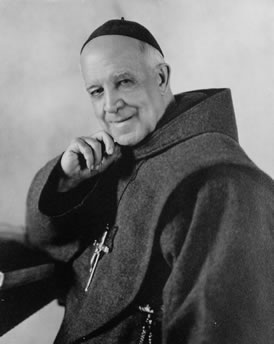
Paul Wattson, SA, born as Lewis Thomas Wattson, was an American priest who co-founded the Society of the Atonement with Mother Lurana White, and the Christian Unity Octave in The Episcopal Church. He was later received into the Catholic Church and is remembered as an advocate for ecumenism.
A Day of Prayer is a day allocated to prayer, either by leaders of religions or the general public, for a specific purpose. Such days are usually ecumenical in nature. They usually are treated as commemorative in nature, rather than as actual liturgical feast days or memorials.
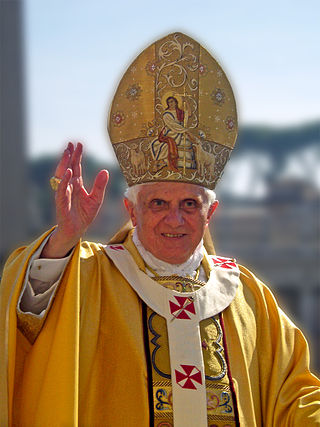
Pope Benedict XVI, who led the Roman Catholic Church as Pope from 2005 to 2013, continued manouevring the Church through the dynamics of modernity, which the Church had begun engaging in with the Second Vatican Council. Because the question of religious pluralism is a key issue raised by modernity, ecumenism, the establishment of harmony and dialogue between the different Christian denominations, is a significant concern of a post Second Vatican Council Church. Pope Benedict XVI's approach has been characterised as leaning toward the conservative while still being expansive and engaged, involving the full breadth of Christendom, including the Orthodox Churches and Protestant churches, as well as freshly engaging with other Christian bodies considered by Roman Catholics to be more heterodox, such as the Church of Jesus Christ of Latter-day Saints.
After the Second Vatican Council, Pope Paul VI contributed in two ways to the continued growth of ecumenism and inter-Christian dialogue. The separated brothers and sisters, as he called them, were not able to contribute to the Second Vatican Council as invited observers. After the Council, many of them took initiative to seek out their Catholic counterparts and the Pope in Rome, who welcomed such visits.
The Dicastery for Promoting Christian Unity, previously named the Pontifical Council for Promoting Christian Unity (PCPCU), is a dicastery within the Holy See whose origins are associated with the Second Vatican Council which met intermittently from 1962 to 1965.
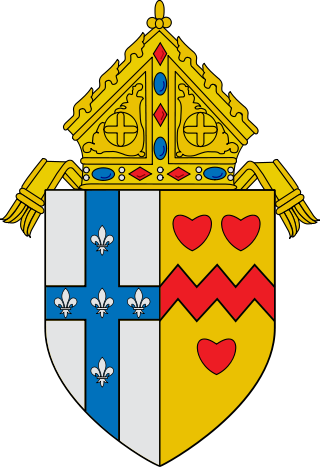
The Personal Ordinariate of Our Lady of Walsingham in England and Wales is a personal ordinariate in the Latin Church of the Catholic Church immediately exempt, being directly subject to the Holy See. It is within the territory of the Catholic Bishops' Conference of England and Wales, of which its ordinary is a member, and also encompasses Scotland. It was established on 15 January 2011 for groups of former Anglicans in England and Wales in accordance with the apostolic constitution Anglicanorum coetibus of Pope Benedict XVI and the Complimentary Norms of Pope Francis of 2013.
Jeffrey Gros was an American Catholic ecumenist and theologian. A member of the De La Salle Christian Brothers, Gros had served as a high school history teacher, university professor, associate director of the Secretariat for Ecumenical and Interreligious Affairs at the United States Conference of Catholic Bishops; director of Faith and Order for the National Council of Churches; and president of the Society for Pentecostal Studies. He is the author or editor of over 20 books, 310 articles, and an uncounted number of book reviews. He died of pancreatic cancer in Chicago, IL, on 12 August 2013 at the age of 75.
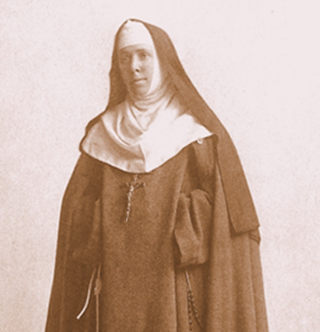
Lurana Mary Francis White (1870-1935) was a Roman Catholic nun, a convert from the Episcopal Church, and co-founder of the Society of the Atonement. This founding was an unusual example of a woman who, in the words of congregation historian Father Charles LaFontaine, "had the distinction of founding a religious community on equal terms with a man."













